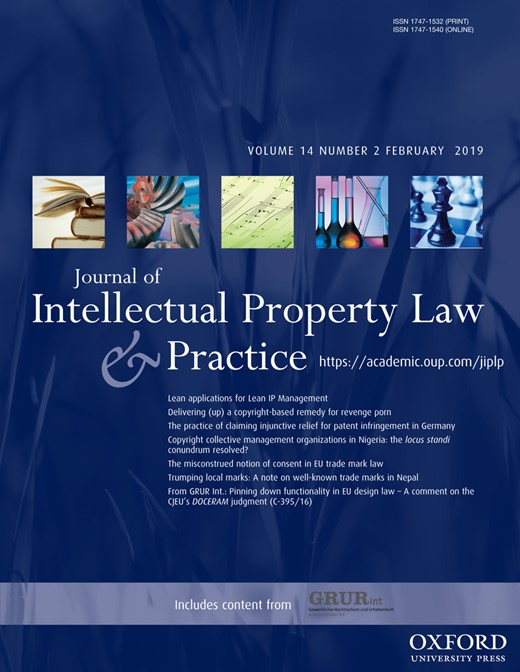-
Views
-
Cite
Cite
Alina Yordanova Trapova, The misconstrued notion of consent in EU trade mark law, Journal of Intellectual Property Law & Practice, Volume 14, Issue 2, February 2019, Pages 136–143, https://doi.org/10.1093/jiplp/jpy148
Close - Share Icon Share
Extract
...
1. Introduction
Once registered, a trade mark grants its proprietor a limited monopoly over the exploitation of a sign in relation to a clearly and precisely tailored list of goods and/or services. The owner holds the exclusive right to authorize use of its registered sign in various ways, including licensing, assignments and transfers. The ability to do this is a core principle of the trade mark framework in the European Union (EU).1 Therefore, it is important that the meaning, as well as the facts and circumstances giving rise to a proprietor’s consent permitting another undertaking to use its trade mark are unambiguous.
This article elaborates on the notion of consent within EU trade mark law in two instances. On the one hand, consent is an inherently important element of the doctrine of exhaustion - the proprietor of an EU trade mark cannot prohibit its use in relation to goods which have already been placed on the European Economic Area (EEA) market under that trade mark by the proprietor himself or ‘with his consent’.2 On the other hand, an important facet safeguarding the delicate balance between the exclusive right of a trade mark and the need to encourage EU competition is the requirement to use a trade mark within a period of 5 years following its registration.3 Importantly, use of the EUTM ‘with the consent’ of the proprietor constitutes use by the proprietor.4 The EU courts and the European Union Intellectual Property Office (EUIPO) seem to interpret the notion of consent in both of these instances in an identical manner, namely by placing a fairly high threshold of proving consent. It will be argued that the particularly strict standard of consent as part of the doctrine of exhaustion has been wrongly injected into the proof of use cases. In doing, so the article bases its reasoning on the rationale behind both the exhaustion doctrine and the proof of use requirement, as well as the context in which commerce has developed today. These illustrate that such direct borrowing of the notion of consent from case law on exhaustion of rights is incorrect and burdensome on the users of the EU trade mark system required to prove genuine use of their trade marks.



